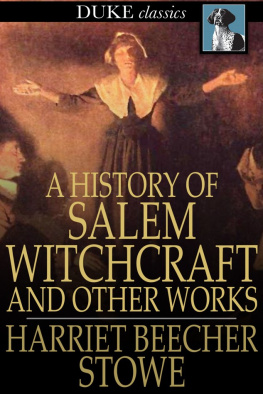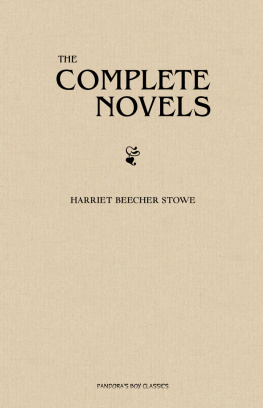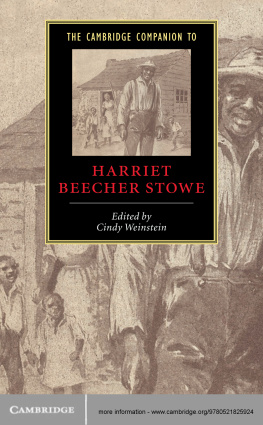Harriet Beecher Stowe - Uncle Toms Cabin (Barnes & Noble Classics Series)
Here you can read online Harriet Beecher Stowe - Uncle Toms Cabin (Barnes & Noble Classics Series) full text of the book (entire story) in english for free. Download pdf and epub, get meaning, cover and reviews about this ebook. publisher: Barnes & Noble, genre: Art. Description of the work, (preface) as well as reviews are available. Best literature library LitArk.com created for fans of good reading and offers a wide selection of genres:
Romance novel
Science fiction
Adventure
Detective
Science
History
Home and family
Prose
Art
Politics
Computer
Non-fiction
Religion
Business
Children
Humor
Choose a favorite category and find really read worthwhile books. Enjoy immersion in the world of imagination, feel the emotions of the characters or learn something new for yourself, make an fascinating discovery.

- Book:Uncle Toms Cabin (Barnes & Noble Classics Series)
- Author:
- Publisher:Barnes & Noble
- Genre:
- Rating:5 / 5
- Favourites:Add to favourites
- Your mark:
- 100
- 1
- 2
- 3
- 4
- 5
Uncle Toms Cabin (Barnes & Noble Classics Series) : summary, description and annotation
We offer to read an annotation, description, summary or preface (depends on what the author of the book "Uncle Toms Cabin (Barnes & Noble Classics Series) " wrote himself). If you haven't found the necessary information about the book — write in the comments, we will try to find it.
Harriet Beecher Stowe: author's other books
Who wrote Uncle Toms Cabin (Barnes & Noble Classics Series) ? Find out the surname, the name of the author of the book and a list of all author's works by series.
Uncle Toms Cabin (Barnes & Noble Classics Series) — read online for free the complete book (whole text) full work
Below is the text of the book, divided by pages. System saving the place of the last page read, allows you to conveniently read the book "Uncle Toms Cabin (Barnes & Noble Classics Series) " online for free, without having to search again every time where you left off. Put a bookmark, and you can go to the page where you finished reading at any time.
Font size:
Interval:
Bookmark:
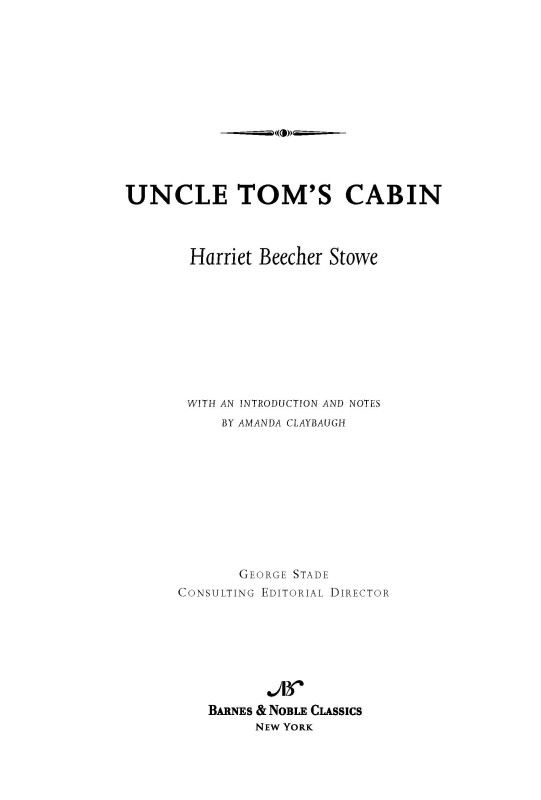
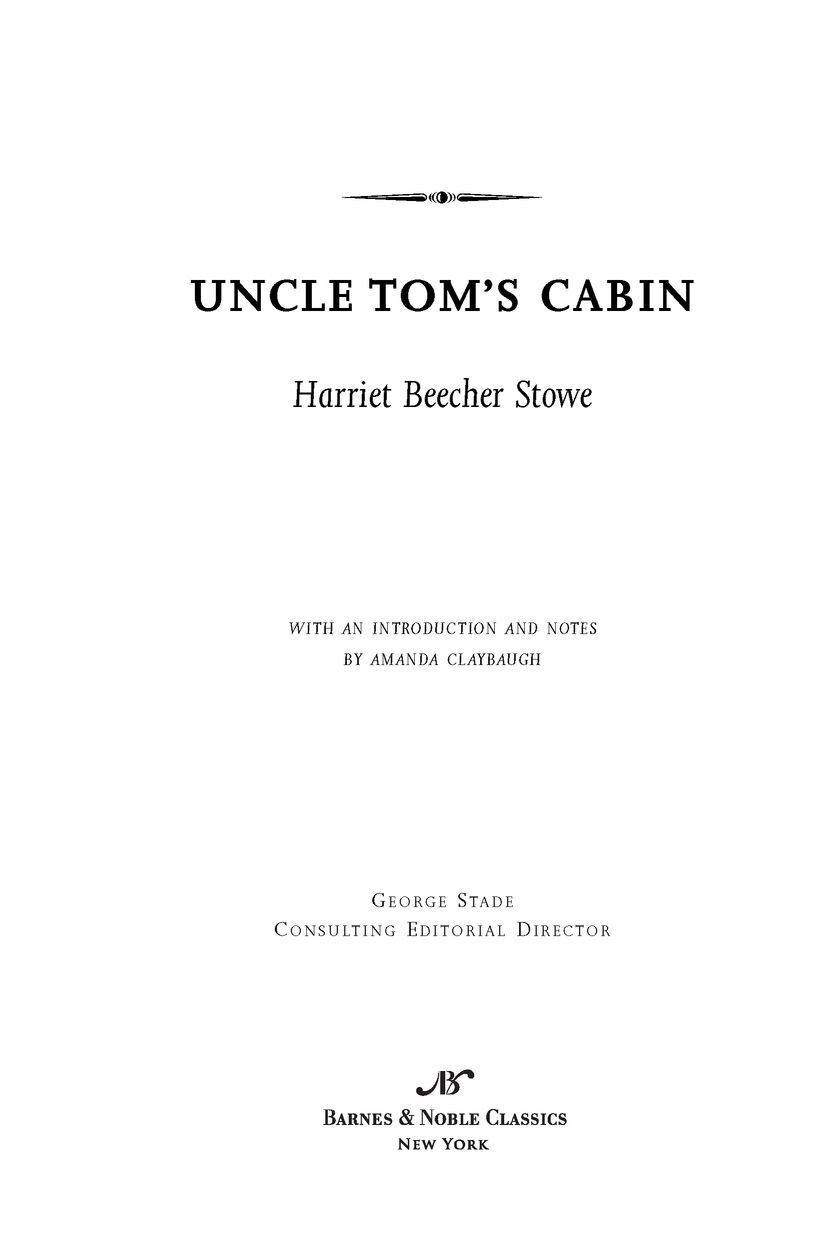
| 1619 | The first Africans are brought to Jamestown, Virginia, and other English colonies in America. |
| 1638 | The New England slave trade begins in Boston. |
| 1661 | The Black Codes legalize slavery in Virginia. |
| 1688 | Members of the Society of Friends protest slavery in German- town, Pennsylvania. |
| 1706 | In his tract The Negro Christianized, Puritan clergyman Cotton Mather argues for the equality of blacks. |
| 1775 | A group of Quakers founds the first Abolition Society in Philadel phia. |
| 1777 | Slavery is abolished in Vermont, and the external slave trade is prohibited in Virginia. |
| 1780 | The Pennsylvania legislature passes a law providing for the gradual abolition of slavery. |
| 1783 | Slavery is abolished in Massachusetts. |
| 1800 | Virginia passes a law prohibiting African-Americans from gathering for religious worship between sunset and sunrise. |
| 1811 | Harriet Beecher Stowe is born on June 14 in Litchfield, Connecti cut, one of eleven children. Her father, Lyman Beecher, is a Calvin ist preacher, the founder of the American Bible Society, and an activist in the antislavery movement. Her mother, Roxana Foote Beecher, is devoted to prayer. |
| 1815 | Stowes mother dies. |
| 1823 | Stowe enrolls at the Hartford Female Seminary in Connecticut, founded by her eldest sister, Catharine. She receives a solid edu cation in foreign languages, natural and mechanical sciences, mathematics, and writing, and eventually becomes an assistant teacher at the school. |
| 1832 | Stowes father remarries and the family moves to Cincinnati, Ohio, where Lyman assumes presidency of the Lane Theological Seminary. Stowe cofounds the Western Female Institute in Cincin |
| nati with Catharine. She has her first contact with fugitive slaves and meets Calvin Ellis Stowe, a professor at the seminary who ar dently opposes slavery. | |
| 1834 | Stowes literary career begins when she wins a contest sponsored by the Western Monthly Magazine; she becomes a regular contributor of stories and essays. |
| 1836 | On January 5 Harriet marries Calvin Stowe. Sympathetic to the Underground Railroad movement, the couple begins to house fugitive slaves in their home. Stowe begins to interview fugitive slaves and travels to Kentucky to witness the brutality of slavery. |
Font size:
Interval:
Bookmark:
Similar books «Uncle Toms Cabin (Barnes & Noble Classics Series) »
Look at similar books to Uncle Toms Cabin (Barnes & Noble Classics Series) . We have selected literature similar in name and meaning in the hope of providing readers with more options to find new, interesting, not yet read works.
Discussion, reviews of the book Uncle Toms Cabin (Barnes & Noble Classics Series) and just readers' own opinions. Leave your comments, write what you think about the work, its meaning or the main characters. Specify what exactly you liked and what you didn't like, and why you think so.


